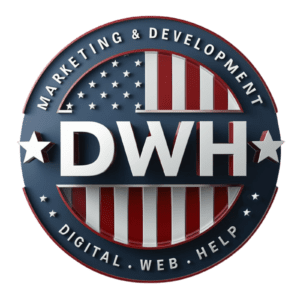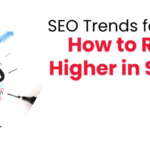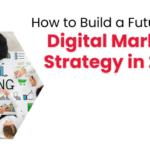
Digital Marketing Trends in 2025 The Future of Digital Marketing and AIs Impact
As 2025 is knocking at the door, digital marketing is growing at an unprecedented rate. One focus area is on AI-powered content strategies, and the other is on climate change mitigation and sustainability. To Address this, marketers must stay ahead of digital marketing trends in 2025. In this blog, we will learn key trends and strategically analyze the future of digital marketing like increased use of Artificial Intelligence, the rise of short-form video, the need for enhancing data protection, and whatnot
Introduction to the Evolving Landscape
The world of digital marketing is undergoing a transformative shift as consumer expectations evolve, and technological advancements reshape how brands engage with their audiences. Staying competitive means not just adapting to these changes, but also embracing innovation that will redefine digital marketing trends. Let us move ahead and explore digital marketing trends in 2025
AI and Automation’s Role in 2025

AI marketing in 2025 will be at the core of digital marketing strategies in 2025. From AI-powered content creation tools to automated campaign management, brands can streamline processes and deliver personalized experiences at scale. Marketing platforms will increasingly rely on AI to analyze customer data, predict trends, and adjust strategies in real-time, enhancing efficiency and effectiveness.
Key Developments in AI Marketing:
- Content Automation: AI will create blog posts, social media marketing, and even visual designs, enabling marketers to produce high volumes of content without human intervention
- Predictive Analytics: AI will forecast consumer behavior and market trends, helping brands target the right audience at the right time
- Chatbots and Virtual Assistants: These tools will continue to offer 24/7 customer service, but with more personalized, human-like responses.
Short-Form Video Marketing Growth
Short-form video, popularized by platforms like TikTok and Instagram Reels, will dominate digital marketing in 2025. Consumers increasingly prefer bite-sized content that’s quick to consume and easily shareable. Brands will need to embrace this trend by creating engaging, creative short-form videos that capture attention in seconds.
Why Short-Form Video Will Continue to Rise:
- Higher Engagement Rates: These videos are more likely to go viral due to their shareability
- Consumer Preference: Younger audiences, in particular, favor fast, visually appealing content
- Cross-Platform Optimization: Videos can easily be repurposed for multiple platforms, maximizing reach
Data Privacy and Its Impact on Strategy

Data privacy has become a central concern for consumers, and by 2025, regulations around data use will be stricter than ever. As governments continue to pass privacy laws like GDPR and CCPA, businesses must adapt their marketing strategies to ensure compliance. This means being transparent about data collection, giving users control over their information, and finding new ways to target customers without relying on third-party cookies
How Data Privacy Will Shape Marketing
- First-Party Data Collection: Brands will need to focus on collecting data directly from their audiences (through opt-ins, surveys, etc.) to personalize experiences
- Contextual Advertising: Instead of using personal data, brands will deliver ads based on content and context, not user behavior
- User Trust and Transparency: Transparent communication about how data is collected and used will be critical to maintaining consumer trust.
Sustainability in Digital Marketing
Sustainability will become a key focus for digital marketing trends in 2025. Consumers are increasingly looking for eco-friendly brands that prioritize sustainability in their products, services, and marketing efforts. As environmental concerns grow, businesses will need to align their values with those of their customers, incorporating sustainability into their digital strategies.
What Sustainable Marketing Will Look Like
- Eco-Friendly Messaging: Brands will highlight their commitment to sustainability in their campaigns, from reducing carbon footprints to using recycled materials.
- Green Digital Campaigns: Marketers will use platforms and tools that are energy-efficient, reducing the environmental impact of their digital activities
- Sustainable Influencer Partnerships: Collaborating with influencers who advocate for environmental causes will enhance brand credibility
Personalization at Scale
By 2025, consumers will expect highly personalized experiences at every stage of their journey. AI will allow brands to deliver these tailored experiences to a larger audience without sacrificing quality. Marketers will use data-driven insights to create personalized content, offers, and recommendations that resonate with individuals on a deeper level
How Personalization Will Transform Marketing
- Dynamic Website Content: Websites will automatically adapt to each visitor based on their preferences, behaviors, and demographics
- Targeted Email Campaigns: AI will enable hyper-segmented email marketing strategy, with each recipient receiving unique content and offers based on past interactions
- Omnichannel Personalization: Consistent, personalized experiences will be delivered across all platforms—email, social media, websites, and more
AI-Powered Content Creation

The incredible growth of AI marketing in 2025 will play an even bigger role in generating content. From writing blog posts and social media updates to creating video scripts, AI-powered tools will help brands maintain a high-quality content marketing practice. This will free up marketers to focus on strategy, while AI handles the execution
Benefits of AI Content Creation
- Faster Content Production: AI tools will generate content in minutes, speeding up the time it takes to launch campaigns
- Scalability: Brands can produce large volumes of personalized content for different audience segments
- Enhanced Creativity: AI will assist in brainstorming new content ideas, enabling marketers to stay creative while scaling their output.
The Growth of Programmatic Advertising
Programmatic advertising, where AI automates the buying and selling of ad space in real-time, will become the norm in 2025. This technology allows marketers to target audiences more precisely and make data-driven decisions in real-time. As AI evolves, programmatic advertising will become more efficient, enabling marketers to optimize ad spending and improve performance
Key Features of Programmatic Advertising:
- AI-Driven Optimization: Ads will be continuously refined and improved based on performance data
- Cost Efficiency: Marketers will be able to reach their target audiences more effectively, reducing investment
- Cross-Channel Integration: Programmatic advertising will work across multiple channels, including display, video, and social media ads
Actionable Steps for Marketers:
- Invest in AI: From content creation to programmatic advertising, AI will be central to future marketing
- Short-Form Video: Keep content fresh, engaging, and optimized for platforms like Instagram Reels
- Prioritize Data Privacy: Make data privacy a cornerstone for building trust and transparency
- Focus on Sustainability: Take eco-friendly marketing initiatives to meet consumer expectations
- Personalize at Scale: Use AI and data analytics to deliver personalized experiences across all channels.
2025 is set to be an exciting year for digital marketing, filled with opportunities to innovate, connect with audiences, and drive business growth. Are you ready to lead the charge?
Signs That Your Business Needs an AI-Driven Digital Marketing Strategy

In today’s competitive landscape, businesses must adapt quickly to technological advances. If you’re noticing any of the following signs, it may be time to integrate AI into your digital marketing efforts
- Stagnant Growth in Customer Acquisition:
If your lead generation campaigns is no longer driving growth, AI can help by automating lead targeting, delivering more accurate customer insights, and improving outreach strategies
- Inefficiency in Content Creation and Personalization:
Struggling to keep up with the demand for personalized content? AI-powered tools can automate content creation, tailor customer experiences, and deliver dynamic website content, significantly reducing the workload while increasing effectiveness
- High Customer Churn Rates:
If you notice that customers aren’t staying loyal to your brand, AI can enhance your customer retention strategies by analyzing behavior patterns and offering personalized recommendations or solutions to keep them engaged.
- Difficulty in Analyzing Data for Insights:
Are you overwhelmed with the volume of customer data and unsure how to turn it into actionable insights? AI can quickly process large amounts of data, identifying trends, preferences, and patterns that can inform your marketing decisions.
- Low Engagement Across Channels:
If your marketing campaigns are underperforming on multiple channels, AI can optimize campaigns in real-time, ensuring ads are shown to the right audience and improving overall engagement
- Time-Consuming Manual Processes:
If your marketing team spends too much time on repetitive tasks like email campaigns, social media scheduling, or customer service responses, AI can automate these functions, freeing up resources to focus on strategic initiatives
By recognizing these signs and implementing an AI-driven digital marketing strategy, your business can stay ahead of the curve, making data-driven decisions that boost efficiency, customer satisfaction, and long-term growth.
Want to Empower Your Brand by Partnering with the Best?

Finding the right digital marketing partner can make a significant difference in the success of your business. This step-by-step approach will guide you through the process of identifying and selecting the best agency or consultant for your digital marketing needs.
- Define Your Business Goals
Before you start looking for a digital marketing partner, it’s crucial to have a clear understanding of your own business goals. Are you aiming for higher lead generation? Increased brand awareness? Or maybe you want to boost sales through targeted advertising? Understanding these objectives will help you narrow down the type of partner you need. For example, if SEO is your focus, you’ll need a professional SEO agency with expertise in that area, while a brand-building campaign may require a more comprehensive approach, including social media, content marketing, and paid media marketing standards.
Don’t miss out—explore the trends shaping social media in the next five years Read More!
- Check Industry Expertise
Not all digital marketing agencies are the same, and industry-specific experience can be a major advantage. Look for a partner that has worked with businesses similar to yours. They will better understand your audience, market trends, and the competitive landscape. For example, if you’re in the healthcare or finance sector, your partner should be familiar with compliance requirements and niche marketing tactics that work best in your industry
- Evaluate Their Services
Different agencies specialize in different areas of digital marketing. When choosing a partner, ensure that their services align with your business needs. A comprehensive agency will offer a full suite of services, including content marketing, SEO services pay-per-click advertising (PPC), social media management, and data analytics. If you’re looking for cutting-edge solutions, check if they offer AI-driven marketing tools and automation, which are becoming crucial for modern businesses. This ensures that all aspects of your digital strategy are covered under one roof
- Assess Technological Capabilities
Technology is at the core of modern digital marketing strategies. A capable digital marketing partner should be proficient in the latest tools and platforms, including AI, machine learning, marketing automation, and analytics software. Their ability to leverage these technologies can greatly influence campaign success, enabling better targeting, personalization, and performance tracking. Ask about their tech stack and how they incorporate emerging technologies into their services
- Consider Communication and Reporting
Transparency and clear communication are key to a successful partnership. You need a digital marketing partner that provides regular updates on campaign progress, performance metrics, and results. Make sure they offer detailed reports that break down important data points such as traffic, conversions, and ROI. Also, assess how well they communicate—whether they’re responsive and proactive in sharing insights or suggestions for improvement. Poor communication can lead to misunderstandings and missed opportunities
- Check Client Reviews and Reputation
Before making a final decision, research the agency’s reputation. Look for testimonials, reviews, and case studies on their website and third-party platforms. A well-established digital marketing partner should have a portfolio showcasing successful campaigns and satisfied clients. Case studies are especially useful for seeing how they handled challenges similar to yours and whether they achieved measurable results. Don’t hesitate to reach out to their previous clients to get an unbiased opinion
- Request a Custom Proposal
Once you’ve shortlisted a few potential partners, request custom proposals from each. This will allow you to see how they would approach your unique business needs and objectives. A well-thought-out proposal should include a detailed strategy, timelines, and expected outcomes. It should also demonstrate their understanding of your business and your challenges. A generic proposal is a red flag, as it indicates they haven’t taken the time to tailor their approach to your specific goals
- Ensure Cultural Fit
Choosing a digital marketing partner is not just about expertise—it’s also about finding an agency that aligns with your company’s culture and values. A good cultural fit ensures smoother collaboration and better communication. During initial meetings, assess whether their working style, attitude, and approach to problem-solving match your expectations. A partner who shares your company’s vision and values will be more invested in your long-term success.
- Review Pricing and Contract Terms
Price should never be the sole deciding factor, but it’s essential to ensure that their pricing structure fits within your budget. Be wary of agencies offering overly low rates or guaranteed results—they may cut corners or employ questionable tactics. Instead, look for transparency in pricing and clear contract terms. Understand the scope of work, deliverables, and timelines, and make sure there’s flexibility in case you need to adjust the project later. Carefully review contract clauses related to termination or exit strategies to avoid being locked into unfavorable terms
Start with a Small Project Now!
Before committing to a long-term partnership with any SEO agency, consider starting with a small, trial project. This could be a limited-scope SEO audit, a short-term ad campaign, or a content marketing initiative. This allows you to evaluate the agency’s performance, work ethic, and compatibility with your team. If they deliver great results and align well with your company’s goals and culture, you can move forward with a more extensive collaboration.
By following these steps, you’ll increase your chances of finding the right digital marketing partner—one who can deliver measurable results and support your business’s long-term growth in the evolving digital landscape.
Conclusion: Preparing for the Future of Digital Marketing
As we move into 2025, digital marketers must embrace these trends to stay competitive. AI, short-form video, data privacy, and sustainability will be critical areas of focus, while personalization at scale will be key to delivering meaningful experiences. Brands that adapt quickly and leverage these trends will be best positioned to grow in the years ahead












